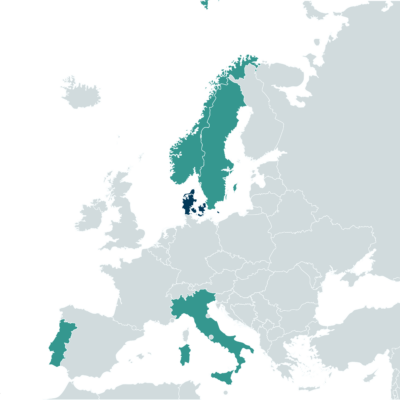BRAVE – Biological Invasions Resolved through Adaptable, Versatile, and Engaging Nature-Based Solutions
Call
Duration
01/02/2025 – 31/01/2028
Total grant
Approx. 1.1 mil. €.
More information
Melina Kourantidou
Partners of the project
- Department of Sociology, Environmental and Business Economics, University of Southern Denmark, Esbjerg, Denmark
- National Research Council – Institute of Sciences of Food Production, Foggia, Italy
- Department of Economics, Swedish University of Agricultural Sciences, Lund, Sweden
- School of Economics and Business, Norwegian University of Life Sciences, Ås, Norway
- Center for applied research, Norwegian school of economics, Bergen, Norway
- Swedish Institute for Food and Agricultural Economics, Lund University School of Economics and Management, Lund, Sweden
- Department of Biological and Environmental Sciences and Technologies, University of Salento, Lecce, Italy
- Department of Veterinary Sciences, University of Messina, Messina, Italy
- Faculty of Economics, University of the Algarve, Faro, Portugal
- Ecology and Restoration of Riverine, Estuarine and Coastal Habitats, Algarve Centre of Marine Sciences, Faro, Portugal

Context
BRAVE tackles the complex ecological and societal challenges of invasive alien species (IAS), emphasizing their dual roles as both beneficial and burdensome. Managing these species requires interdisciplinary approaches to optimize outcomes for biodiversity, the economy, and society. The project assesses NbS for IAS management with active stakeholder engagement and participatory valuation methods that highlight the ecological, social, and economic benefits of NbS. Three case studies across the Nordics and the Mediterranean explore the values and conflicts related to the Pacific Oyster (Denmark, Norway, Sweden), Pacific Pink Salmon (Norway), and Blue Crab (Italy, Portugal). BRAVE examines the socio-ecological impacts of harvests, including recreational and volunteer efforts, evaluating their effectiveness for conservation. By highlighting the clash between economic opportunities and conservation, we aim to provide a framework for optimal policy that integrates ecological, economic, and societal concerns. Through economic tools, we assess trade-offs, user values, and design incentive mechanisms to improve biodiversity management while safeguarding ecological integrity. BRAVE brings a social science perspective to IAS management, a field traditionally dominated by natural sciences. Engaging stakeholders—from fisheries and conservation managers to citizens and entrepreneurs—BRAVE offers a framework that uncovers trade-offs and solutions, promoting conservation through socioecological synergies. The outcomes will inform policies and management strategies designed to address current challenges and align with diverse stakeholder values, fostering more effective practices.
Main objectives
BRAVE aims to develop a framework for IAS management acknowledging their multiple roles, focusing on NbS for balancing conservation with societal needs. Specifically, BRAVE seeks to: 1) Assess trade-offs in IAS management by integrating ecological, social and economic perspectives; 2) Assess the effectiveness of NbS in restoring ecosystems impacted by IAS; 3) Develop participatory valuation methods; 4) Design economic tools and incentive mechanisms to align conservation efforts with user values; 5) Generate evidence-based recommendations for biodiversity policies and invasion management.
Main activities
Key planned activities include: 1) Ecological impact assessments focusing on IAS’s interactions with native species and ecosystem processes; 2) Bioeconomic modelling to understand trade-offs of different management strategies; 3) Valuation studies using both revealed and stated preference methods to quantify values for the IAS assessed.
BRAVE will disseminate findings and share knowledge with stakeholders, including policy-makers, local communities, and industries affected by MR-IAS. Dissemination and stakeholder engagement activities include: accessible policy briefs and scientific papers, workshops, focus groups and stakeholder meetings, educational material to raise awareness and digital platforms. By engaging stakeholders from fisheries, conservation, and local communities, BRAVE informs policy-making and IAS management. It provides actionable frameworks to uncover trade-offs, incentives, and solutions for sustainable management that consider diverse stakeholder values, contributing to transformative policy change.

